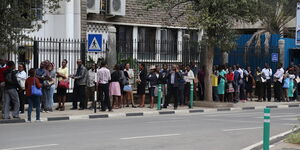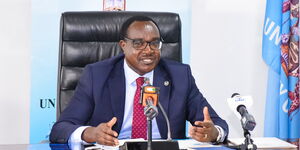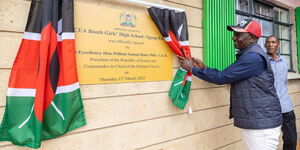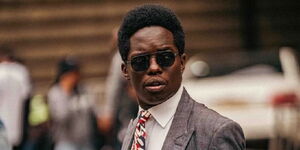Promulgation of the 2010 Constitution ushered in a new judicial system in Kenya with the creation of the Supreme Court as the country’s apex court.
In what was a change from the previous judicial system, the architects of the 2010 Constitution instituted an independent Judiciary headed by a Chief Justice who also serves as the President of the Supreme Court.
Since its inception in 2011, the court has been under different leadership and sets of judges. Whilst most of them vacated their positions after reaching the statutory age of retirement, the exit of some notable judges was marred with controversies.
CJ Willy Mutunga
Chief Justice (retired) Willy Mutunga made history as the first Chief Justice under the 2010 Constitution. Mutunga occupied the position for four years before retiring in 2016.
Worth noting is that Mutunga was part of the six-judge bench that upheld the election of President Uhuru Kenyatta and his deputy William Ruto in 2013. He also created the office of an ombudsman in 2011 to address misdeeds by judicial officials.
Besides his time as the head of the Judiciary, Mutunga’s contribution is evident from the role he played in the process of drafting the 2010 Constitution.
After his retirement, Commonwealth appointed him as a Special Envoy to the Maldives to offer guidance on constitutional reforms and democracy. In addition, Mutunga has been issuing commentary on issues that appertain upholding of the rule of law.
Being a distinguished legal scholar, Mutunga has been given public lectures to various law schools in Kenya and Africa at large.
Nancy Baraza
Nancy Baraza was part of the pioneer judges of the Supreme Court after its inception. Baraza was appointed as the Deputy Chief Justice in 2011 where she served alongside Willy Mutunga.
However, her term in office was cut short after a scandal emerged with accusations that she physically assaulted a security guard at a popular shopping mall in Nairobi.
The allegations led to a probe into the eligibility to hold the office. Eventually, Baraza resigned from the office of Deputy Chief Justice in 2012, less than two years after her appointment.
Baraza, a holder of a Philosophy Degree (PhD) in law, is also a lecturer at the University of Nairobi School of Law.
Justice Phillip Tunoi
Justice Philip Tunoi was also part of the inaugural Supreme Court bench. His tenure as a judge of the country’s apex court ran between 2011 and 2016.
Among the highlights of his term as a Supreme Court judge is the 2013 presidential petition where he judged.
He also adjudicated the case of former governor Ferdinand Waititu who was challenging the win of Evans Kidero in the gubernatorial contest in 2013.
This case would, however, come back to haunt him after allegations emerged that he had received a bribe of Ksh 200 million from Evans Kidero. This scandal was succeeded by an inquiry into the matter before he retired.
The report of the inquiry committee of the Judicial Service Commission (JSC), however, indicated that there was no evidence of gross misconduct and as such, the petition lacked enough grounds to prompt his dismissal from office.
CJ David Maraga
After the retirement of CJ Willy Mutunga in 2016, his replacement called for a man capable of fitting his shoes in defending the Constitution and administering justice. The JSC settled on David Maraga, a former judge of the Court of Appeal as the rightful successor- a position he occupied until 2021.
The firebrand judge is remembered for his firm stances on the independence of the judiciary which in some instances put him at loggerheads with President Uhuru Kenyatta.
Maraga was part of the bench that nullified the election results of the 2017 elections - making history as the first-ever Supreme Court to overturn a presidential election.
He also opposed the decision of President Uhuru to leave some judges out in the list of appointments despite a recommendation from the JSC. Maraga also called for Uhuru's impeachment for declining to appoint the 41 judges and ordered him to dissolve Parliament for failing to achieve the two-thirds gender rule.
Jackton Ojwang
Justice Jackton Boma Ojwang was also part of the inaugural judges of the Supreme Court. He, alongside other judges, adjudicated the 2013 and 2017 presidential election petitions during his time at the apex court.
Ojwang's last day in office was surrounded by a myriad of allegations, among them being conflict of interest.
A tribunal created to investigate his conduct, however, acquitted him in a report presented to President Uhuru Kenyatta.
Kalpana Rawal
Retired Lady Justice Kalpana Rawal's name also stands out in the history of Kenya's Supreme Court. Rawal took over as the country's second Deputy Chief Justice after the resignation of Nancy Baraza.
In the period preceding her exit from office, Rawal was involved in a tussle between her and the judiciary employment body, JSC.
Rawal argued that she was employed under the dictates of the Constitution and as such her retirement age ought to have been 74 years.
The Supreme Court delivered a ruling which officially set the retirement age of jurists at 70 years.












